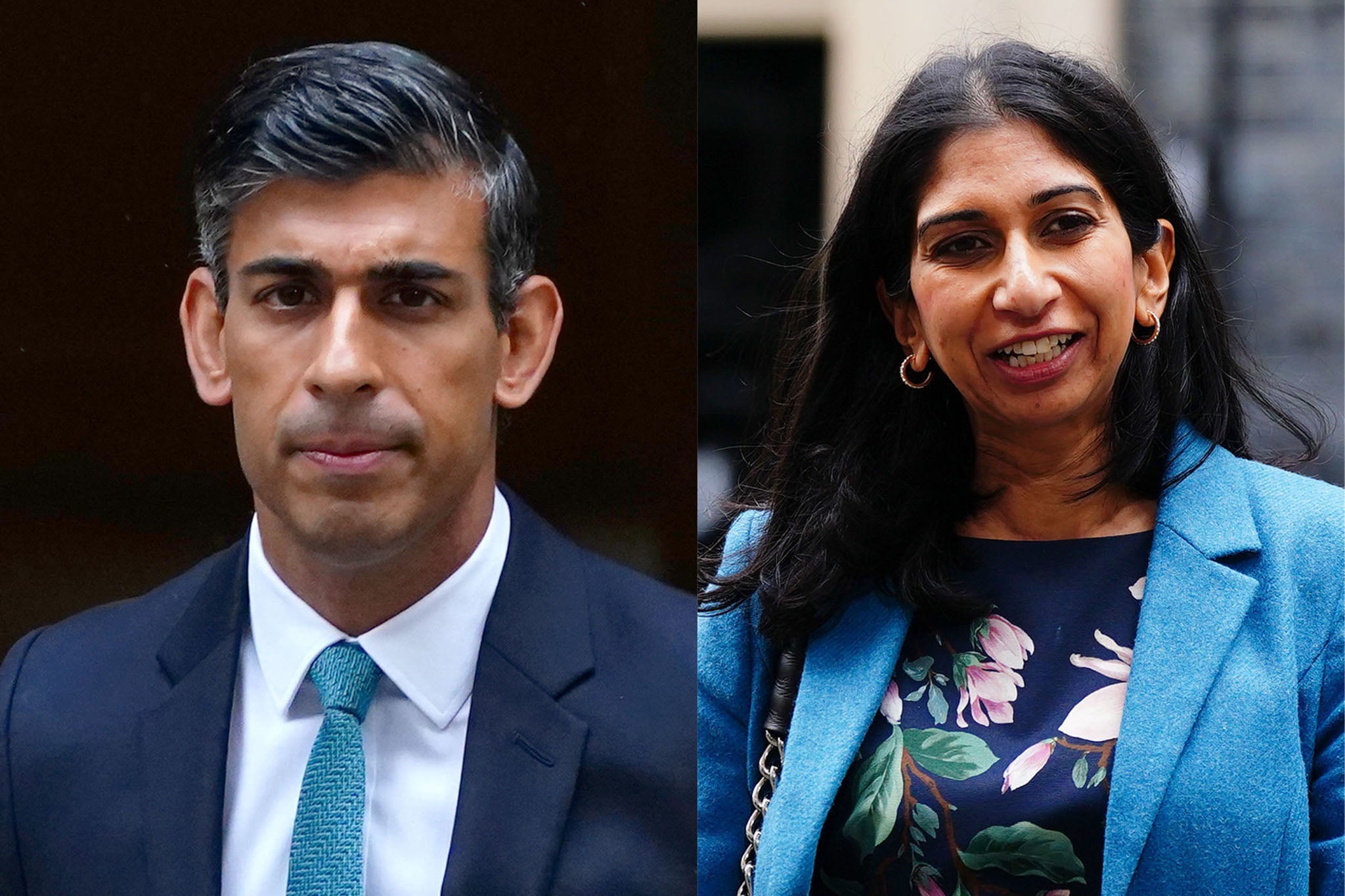How Sunak’s future – as well as Suella Braverman’s – hangs in the balance
We have a prime minister waiting to see whether he feels strong enough to fire his home secretary, writes Andrew Grice. Whichever choice he makes, the delay is damning to his authority


Traditionally, Conservatives lined up to criticise left-wing Labour politicians for undermining the rightly sacred operational independence of the police. Today, the roles are reversed after Suella Braverman’s incendiary claim the police apply double standards on protests.
It’s another sign of the times: Labour is increasingly acting like a government and the Tories like an opposition. Braverman has inadvertently boosted Keir Starmer’s credentials on law and order just as the Tories draw up plans to demolish them at the coming election. Prior to the home secretary’s article in The Times criticising the police, the Tories were united on the fallout from the Israel-Hamas war, while Labour’s divisions created damaging headlines for Starmer. Now, the Tories are split over Braverman’s remarks and whether she should keep her job.
Labour was also more statesmanlike than the Tories about tomorrow’s pro-Palestinian march in London on Armistice Day; opposition frontbenchers said last weekend the planned route wouldn’t go past the Cenotaph in Whitehall, while Tories whipped up fears that it would. The organisers, the Palestinian Solidarity Campaign, told the Metropolitan Police a few weeks ago the march would avoid Whitehall – one reason why Mark Rowley, the Met commissioner, judged there was no need to ban it.
Braverman allies insist that, in alleging the police “play favourites” in their handling of protests, she is merely saying what a majority of people in this country are thinking. I’m not so sure. Freedom of speech, preserved by the heroes of two world wars who will be remembered in Sunday’s service at the Cenotaph, can’t be selective and must extend to people with whom you don’t agree. Sensible Tories accept this, while Braverman would rather play politics – including internal politics against Sunak by refusing to make all the changes to the article that Downing Street was within its rights to demand.
Her act of defiance is probably a breach of the ministerial code, which says “major interviews and media appearances, both print and broadcast,” should be agreed with the No 10 press office.
Even before the article emerged, Tory MPs were urging Sunak to sack her, as I reported on Wednesday.
Those numbers have grown considerably since. One Nation Conservatives never liked Braverman but her extreme language, rather than her actual views, has now lost the support of many mainstream Tories.
They are appalled that a Tory home secretary stirred up rather than calmed down community tensions at a highly sensitive time and made the police’s already difficult job at the march even harder. Indeed, Braverman has foolishly added the police to the list of non-partisan institutions the Tories undermined during the Johnson and Truss regimes – parliament, the courts, the civil service and the Office for Budget Responsibility among them. It wasn’t supposed to continue on Sunak’s watch.
The prime minister has a huge dilemma: he will look weak if he doesn’t sack Braverman but dismissing her would risk a right-wing backlash. There are predictable dark threats that 60 right-wing MPs would force a vote of confidence in him as party leader in the hope of installing Braverman before the election. Back on Planet Earth, her Tory enemies put her gang at more like six.
I don’t believe the right would secure the numbers required to trigger such a vote – 53 Tory MPs, 15 per cent of the 350 – but they could make enough noise to destabilise Sunak in the election run-up. This would make the Tories look like a rabble again, blowing up Sunak’s claim to have brought stability after the turmoil and divisions of recent years.
Braverman’s future may now hinge on what happens at tomorrow’s march; if there is serious disorder, she will doubtless claim she has been vindicated. It might also depend on the Supreme Court’s judgment next Wednesday on her controversial plan to send migrants to Rwanda.
If the court rules in the government’s favour, Sunak might find it harder to fire Braverman. But if it loses, she will have failed, even though on this occasion she is carrying out Sunak’s policy. Defeat would see Braverman intensify her campaign for the UK to leave the European Convention of Human Rights (ECHR). Sunak would probably prefer she did that from the backbenches, though the permanent rebel would then have a cause that appealed to many Tories – and might force Sunak to promise a referendum on quitting the ECHR in the Tory manifesto.
So we have a prime minister waiting to see whether he feels strong enough to fire his home secretary. Although Sunak will claim it’s all about due process, the delay in deciding her fate erodes his authority. Keeping Braverman after her act of open defiance would further diminish it, which is why she has to go.






Join our commenting forum
Join thought-provoking conversations, follow other Independent readers and see their replies
Comments